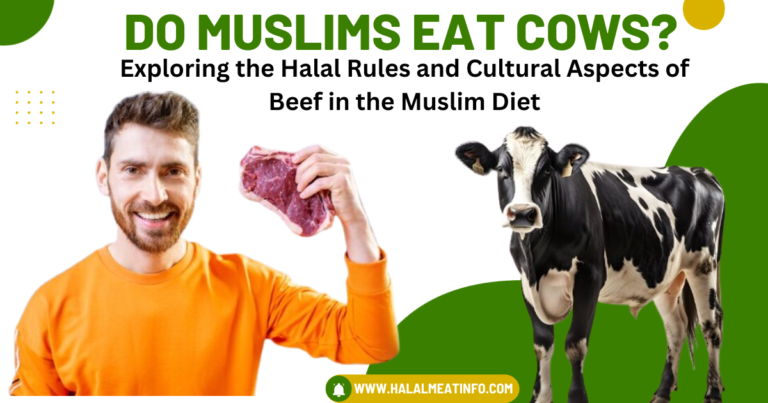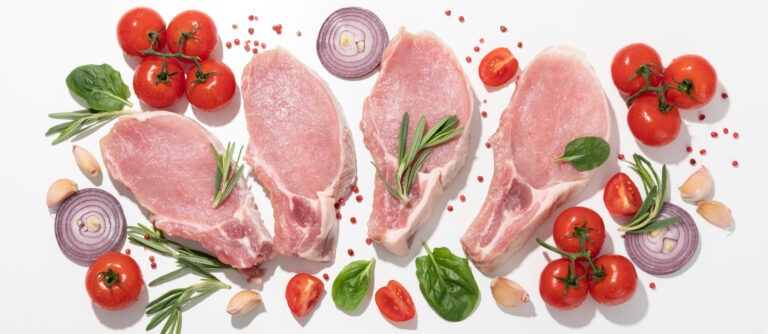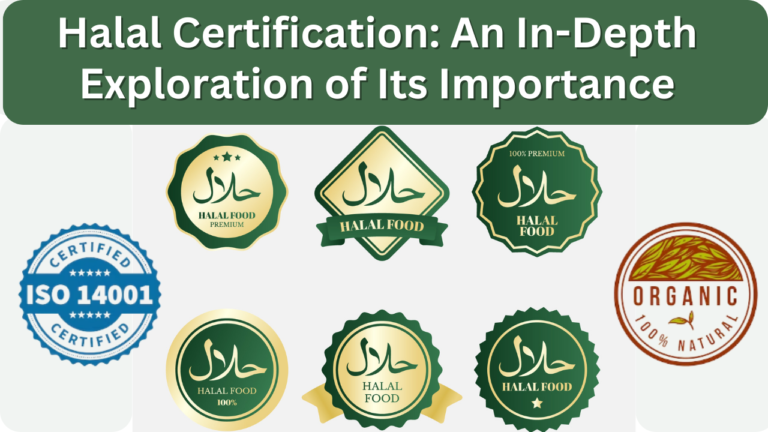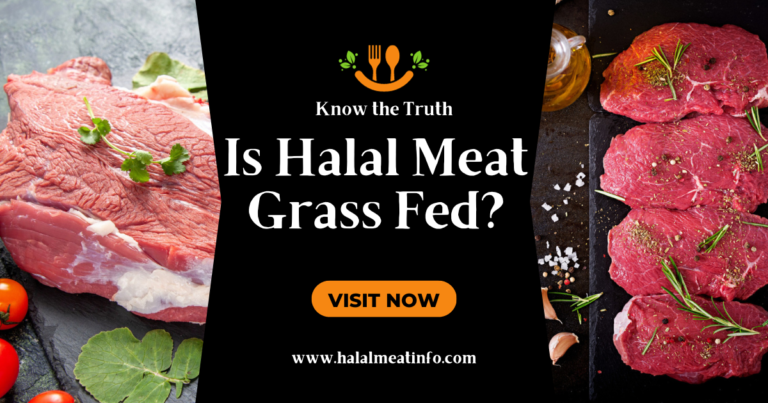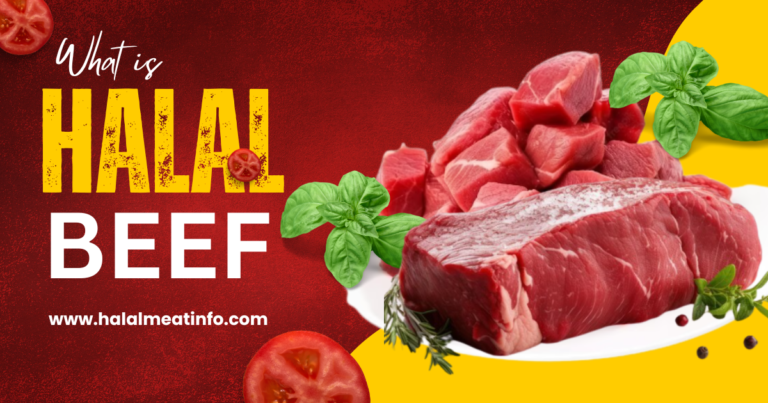Is Horse Meat Halal? Navigating Religious Considerations in Dietary Choices
Horse meat sparks debates in various cultures globally, with some considering it a delicacy embedded in their traditional cuisine. However, for others, consuming horse meat may be a religious or ethical concern.
This article explores the question ‘Is horse meat halal?’ and whether horse meat aligns with halal principles. We will examine this query through the lens of Islamic dietary rules. Furthermore, we will navigate through various viewpoints and debates related to this topic, incorporating scholarly perspectives to furnish a complete analysis that assists you in making a well-informed decision. let’s begin!
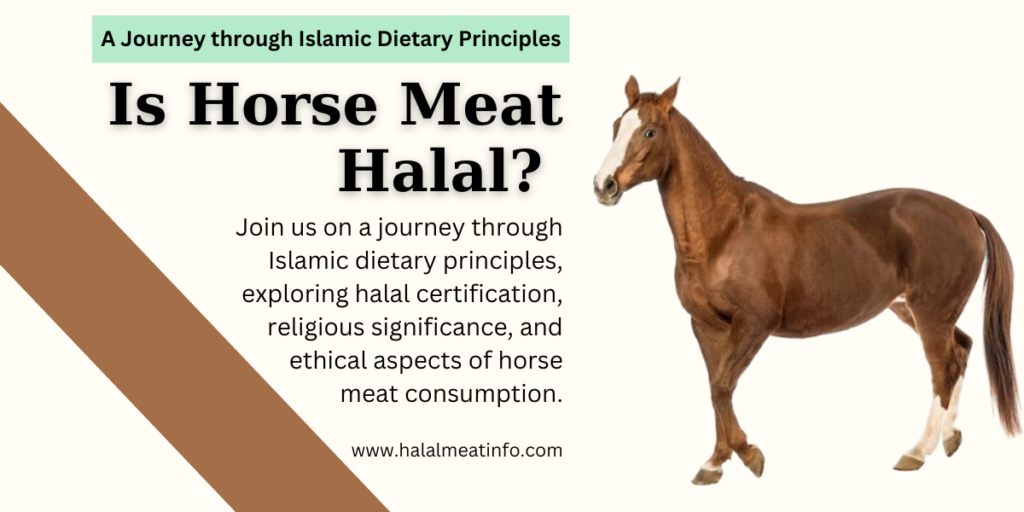
Understanding Halal Diet
Before we can answer the question of whether horse meat is halal or not, it is important to understand what halal means in relation to food. Halal diet is a term used to describe food that adheres to Islamic dietary laws, also known as Shariah. These laws dictate what is considered permissible (halal) and prohibited (haram) for Muslims to consume.
Generally, a halal diet prohibits pork and its by-products, alcohol, and mandates specific slaughter methods for meat (explained later). It also promotes the consumption of clean and healthy food, with an emphasis on the humane treatment of animals.
Introduction to Horses
Horses are majestic creatures. They have a rich history with humans. In the past, people used horses for transportation, farming, and war. Today, horses continue to captivate us with their strength and beauty. They are often found in sports like racing or polo.
Are Horses Ruminants?
Horses, despite their herbivorous diet, are not classified as ruminants. Unlike cows and sheep, who are true ruminants, horses do not possess a multi-chambered stomach for fermenting plant material. Instead, they have a simple stomach and a large cecum, where fermentation of fibrous plant material occurs. This makes them more akin to a monogastric organism, or single-stomached animal. However, their unique digestive system allows them to efficiently process a diet high in fiber, making them well-adapted to their natural grazing habits.
Horse Meat in Historical Context
Horse meat has held different meanings across time and cultures. For some ancient societies, horses were sacred animals, and consuming their meat was unthinkable. In contrast, others saw horse meat as a valuable food source. In times of scarcity, it even served as a survival staple. This historical context highlights how views on horse meat consumption have evolved and varied greatly. Understanding this context helps inform our discussion on whether horse meat is halal.
What Country Eats Horse Meat
The Question “Which countries eat horse Meat” is a complex one. Horse meat consumption varies between countries and regions, influencing cultural perspectives. Historically, horse meat has been eaten in countries like China, Japan, and Russia. Today, it is still consumed in parts of Asia and Europe.
In Central Asia, countries like Kazakhstan and Mongolia relish horse meat. It holds cultural significance and forms part of their traditional cuisine. European nations such as Italy, France, and Belgium also consume horse meat, although it’s more of a niche food than a staple. In South America, it’s eaten in countries like Argentina and Uruguay, known for their meat-rich diets. Horse meat is also consumed in Japan, where it is served raw in a dish called ‘Basashi’. Each of these countries has its own unique methods of preparation and consumption of horse meat, reflecting their diverse culinary traditions.
What Does Horse Meat Look Like
Horse meat has a distinct appearance that sets it apart from other types of meat. Generally, the meat is lean and has a slightly sweet flavor. Visually, horse meat is darker in color, often described as a deep cherry red or burgundy. This is due to the higher levels of myoglobin, a protein in muscle tissue that binds oxygen. It has a texture akin to beef but tends to be slightly firmer, with appearance variations based on factors like diet, age, and meat cut. In many dishes, horse meat can be easily mistaken for beef due to similarities in texture and color, but its unique taste is a telling sign of its identity.
Islamic Teachings on Horse Meat
In Islamic teachings, the permissibility of eating horse meat is a subject of discussion. The Quran, Islam’s holy book, does not explicitly label horse meat as haram (forbidden). However, the matter becomes complex when we delve into the Hadiths — the sayings and actions of Prophet Muhammad (ﷺ). Some Hadiths suggest that Prophet Muhammad (ﷺ) allowed the consumption of horse meat. In contrast, others cite instances where he abstained from it. This creates a gray area in Islamic jurisprudence.
Is Horse Meat Halal in Islam
To delve into the permissibility of horse meat in Islam, we turn to the two main sources of Islamic law: the Quran and the Hadiths. The Quran serves as the primary guide for Muslims, supplemented by Hadiths—records of Prophet Muhammad’s (ﷺ) actions and sayings.
Horse Meat in Light of the Quran
In the context of understanding the permissibility of consuming horse meat, a crucial reference is from the Holy Quran. Surah An-Nahl, verse 8, highlights the creation of horses, mules, and donkeys for riding and adornment. In another verse of Surah al-Baqarah (168) “O mankind, eat from whatever is on earth [that is] lawful and good”, Interpreting these verses, scholars deduce that horses serve humans in various ways. However, this verse does not explicitly mention the consumption of horse meat, leaving room for interpretation and scholarly discussion.
Horse Meat in Light of Hadith
Delving into Islamic teachings, we find references concerning horse meat in the Hadith. As documented in Sahih Bukhari (5512) and Sahih Muslim (1942), Prophet Muhammad (ﷺ) permitted the consumption of horse meat. Therefore, from an Islamic viewpoint, eating horse meat is considered halal, or permissible, under specific conditions such as proper slaughtering methods. This is a significant point for those questioning the status of horse meat in Islamic dietary laws.
Kazakhstan Embassy’s Obtained Fatwa on the Halal Status of Horse Meat
The Kazakhstan Embassy made an inquiry to the esteemed Al Azhar Al Sharif Islamic Research Academy in Egypt. They wanted to know if consuming horse meat, a delicacy in their Muslim-majority country, aligns with Islamic dietary laws. The Academy provided an official Fatwa in response to their query. It clarifies that under Islamic law (Shariah), horse meat consumption is acceptable when the prescribed guidelines for slaughter are followed. On the basis of Fatwa the Horse Meat is Halal in the Muslim country of Kazakhstan. In light of Fatwa, the consumption of horse meat is used as a delicacy in Kazakhstan, a Muslim-majority country.
If you’re curious about the dietary laws of other uncommon meats, check out our article on whether giraffe meat is considered Halal.
Why Is Horse Meat Haram
There are scholars who forbid the consumption of horse meat, citing various Hadiths as their basis. One such reference is Hadith Dawud No. 3785, which sheds light on the prohibition of horse meat. Another reference can be found in Hadith Sunan al Nisai No.4332, which further supports the argument against consuming horse meat.
Yet another perspective is provided by Hadiths narrated by Bukhari no. 5530, along with Muslim no. 1934, are notable for their perspective on this matter. Notably, these Hadiths do not explicitly forbid consuming horse meat. Instead, they imply that the primary role of horses is for transportation and warfare, not consumption.
This viewpoint is taken by some scholars to infer that horse meat should not be consumed. Therefore, despite the general permissibility of horse meat within Islamic dietary laws, these select interpretations can lead to a diverging perspective, discouraging the consumption of horse meat.
Views from Different Islamic Schools of Thought
The issue of horse meat consumption is interpreted differently among various Islamic schools of thought.
Is Horse Meat Halal in the Hanafi School of Thought?
The Hanafi School, one of the four major Sunni Islamic schools of thought, has its unique interpretation on the subject of horse meat. The Hanafi generally consider horse meat as Makruh Tahrimi. The term ‘Makruh Tahrimi’ means strongly disliked or discouraged, but not entirely prohibited or sinful. Therefore, while it is not preferred or recommended to consume horse meat according to Hanafi jurisprudence, doing so is not considered sinful.
Shafi’s Viewpoint on Horse Meat Consumption
According to Madhhab al-Shafi’i, consuming horse meat is considered halal and not makruh. This perspective is documented in al-Majmu’ Syarh al-Muhazzab, 9/4. Therefore, in the Shafi’i school, there is no discouragement or disapproval towards the consumption of horse meat, further highlighting the differences in interpretation across Islamic jurisprudence.
Maliki Viewpoint on Horse Meat Consumption
In the Maliki school, another significant Sunni Islamic school of thought, the stance on horse meat aligns more closely with the Hanafi view. Maliki scholars classify horse meat as Makruh Tanzih. This term signifies something that is not firmly detested or strongly discouraged, but rather mildly disliked. Thus, consuming horse meat, while not enthusiastically encouraged, is not seen as sinful according to Maliki jurisprudence.
Is Horse Meat Halal According to Askimam?
As per Askimam, the act of slaughtering a horse is seen as Makruh Tahrimi. Nonetheless, if a horse has been pre-slaughtered or the meat is readily accessible for consumption, it’s deemed appropriate to eat. For instance, when someone travels abroad or dines at a restaurant where horse meat is served, consuming this is allowed.
Is Horse Meat Halal Islamqa
According to IslamQA, horse meat is deemed halal and permissible to consume according to the majority of scholars. This ruling is based on narrations from the Hadiths, particularly one where the Prophet Muhammad (ﷺ) reportedly consumed horse meat. It’s important to note that while some scholars, particularly those from the Hanafi school of thought, discourage eating horse meat.
Fatwa from Darulifta-Deoband on Horse Meat Consumption
Darulifta-Deoband Fatwa, the consumption of horse meat is permissible (halal), but it is not considered the best option. While not explicitly discouraged, consuming horse meat is not seen as superior or preferable under their interpretation.
Is Horse Meat Halal in Shia
According to Shia scholars, eating the meat of a domestic horse is not considered “haram” or forbidden. However, it is classified as “makruh”, which means it is better to refrain from eating it, though it is not a sin to do so. This allows followers some flexibility, permitting them to decide whether or not to consume horse meat based on their personal preference and interpretation of religious teachings.
Is Horse Meat Halal in Turkey?
Turkey, a predominantly Muslim country, observes Islamic dietary laws. However, the consumption of horse meat isn’t widespread. Cultural preferences and culinary traditions significantly influence the acceptance of horse meat. While there’s no explicit prohibition in Islamic law, the consumption of horse meat isn’t universally accepted among Turkish Muslims. As always, it’s advised that individuals consult with local religious authorities for guidance on such matters.
Can You Eat Horse Meat in the US?
In the United States, horse meat consumption is uncommon and faces cultural resistance. While there are no explicit federal laws that prohibit eating horse meat, there has been a de facto ban on its sale and slaughter since 2007 due to the absence of funding for inspection processes. This scenario makes it extremely difficult, if not impossible, to find horse meat in mainstream markets. It’s important to note, however, that individual attitudes toward eating horse meat can vary greatly, and cultural norms are continually evolving.
Is Horse Riding Halal or Haram?
The act of horse riding does not fall under the category of halal or haram since it is not a dietary matter. Rather, it is an activity that has been practiced since ancient times, and it holds a significant place in Islamic history. Surah An-Nahl, verse 8, emphasizes the creation of horses as a means of transportation and beauty. Horse riding was a common mode of transportation during the time of the Prophet Muhammad (ﷺ), and it was also used in battles. There are even Hadiths that depict the Prophet (ﷺ) himself riding horses. Therefore, from an Islamic perspective, horse riding is permissible and not considered haram. However, as with any activity, it should be carried out in a manner that aligns with the principles of modesty, respect, and safety dictated by the Quran and Hadiths.
Legality of Horse Meat in Different Countries
Is Horse Meat Illegal In The US?
In the United States, the legality of horse meat consumption is a multifaceted issue. While there aren’t federal laws explicitly prohibiting the consumption of horse meat, there are regulations that make the slaughter of horses for meat extremely difficult. From 2007 to 2011, the USDA did not fund inspections for equine slaughter houses, effectively making the production of horse meat for human consumption illegal. However, in 2011, this legislation lapsed, opening the door for the potential legal slaughter of horses for meat. Despite this, as of today, there are no operating horse slaughterhouses in the U.S., making horse meat largely inaccessible to American consumers.
Is Horse Meat Legal in Canada?
Unlike its southern neighbor, Canada has a different stance on horse meat. The consumption of horse meat is legal in Canada, and it also has several operational horse slaughterhouses. This meat is sold in various markets and restaurants, especially in French-speaking regions like Quebec. It’s important to note that these practices are subject to regulations around animal treatment and food safety standards.
Is Horse Meat Legal in the UK?
In the United Kingdom, the consumption and sale of horse meat is legal, but it’s not traditionally part of the British diet. There are strict regulations in place for the slaughter and sale of horse meat; horses must have a ‘passport’ that follows them throughout their life to ensure they are fit for consumption. Despite its legality, horse meat is rarely found in shops or restaurants due to cultural preferences and societal attitudes. Its consumption tends to provoke strong reactions among the British public, largely due to the emotional connection many people feel towards horses.
Horse Meat Alternatives: Halal Meat Options
For individuals seeking halal alternatives to horse meat, there are numerous options available. Beef, lamb, and chicken are all common forms of halal meat, widely available and versatile for a variety of dishes. Venison, the meat of deer, is also a popular choice due to its lean composition and rich flavor. For those who enjoy seafood, many kinds of fish and shellfish are permissible under Islamic dietary laws. Additionally, plant-based proteins like lentils, chickpeas, and tofu are excellent halal options for those seeking a vegetarian or vegan lifestyle. As always, it’s important to ensure that any meat consumed is not only permissible by species but also processed in accordance with halal practices.
FAQ’s
No, horse meat consumption is not widespread in Turkey due to cultural preferences and culinary traditions.
Horse riding is neither halal nor haram as it is not a dietary matter. It’s a permissible activity in Islam as long as it aligns with Islamic principles of modesty, respect, and safety.
Technically, there are no federal laws prohibiting the consumption of horse meat, but it’s practically inaccessible due to lack of funding for inspection and absence of slaughterhouses.
Yes, the consumption of horse meat is legal in Canada and is subject to regulations about animal treatment and food safety standards.
Halal alternatives to horse meat include beef, lamb, chicken, venison, many kinds of fish, and plant-based proteins like lentils, chickpeas, and tofu.
Conclusion
In conclusion, the consumption and legality of horse meat varies greatly around the globe, with cultural, religious, and personal beliefs playing a significant role. For Muslims, the question of whether horse meat is halal or haram remains open to interpretation. The horse is primarily considered halal by many scholars, yet some mark it as “makruh”. Horse riding, on the other hand, is universally accepted as a part of Islamic history and tradition. Various countries have differing stands on the legality of horse meat, with the U.S., Canada, and the U.K. each having their unique approach. When in doubt, there are ample halal alternatives to horse meat available, ensuring everyone can adhere to their dietary restrictions or preferences while enjoying a diverse range of foods.

